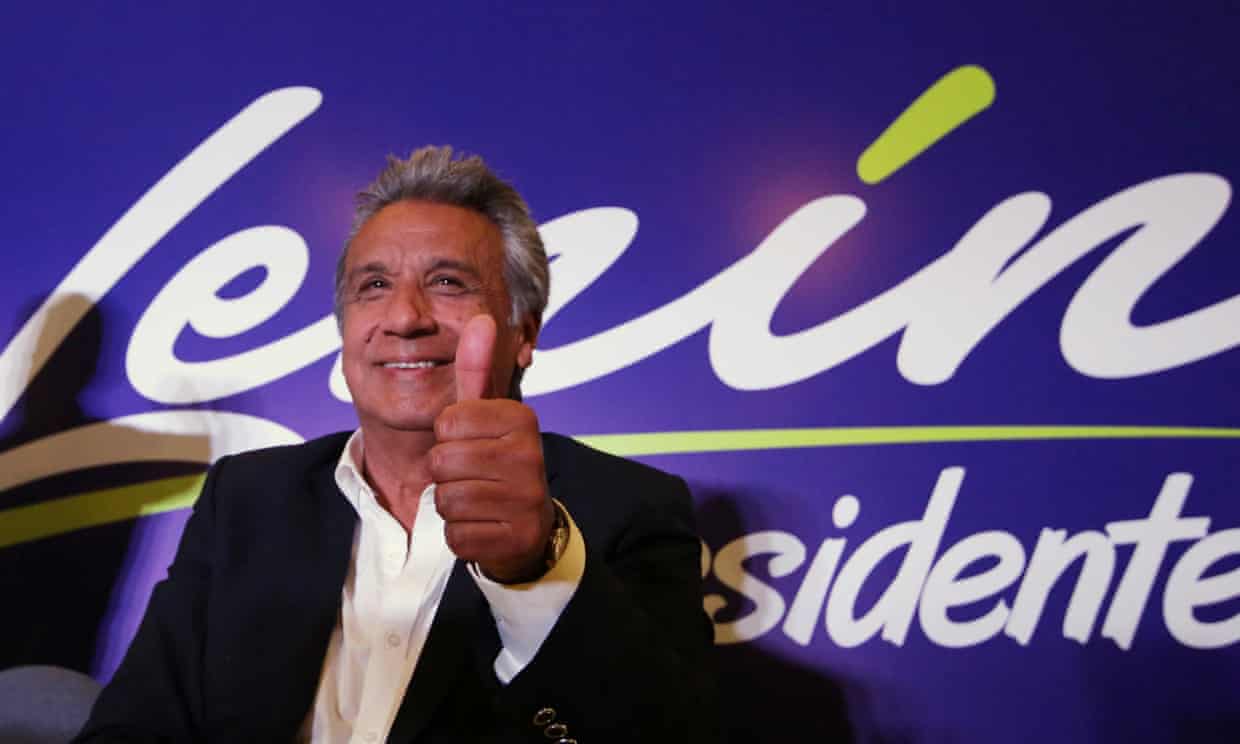2017 Presidential Election

Presidential Candidate Lenin Moreno (www.theguardian.com)
Since I wrote my Background and Analysis, Ecuador began their 2017 presidential elections. The article “Ecuador election: Moreno facing runoff as 40% vote looks out of reach,” describes the election that will replace President Rafael Correa who has been in office since 2007. In this election, the two frontrunners are the leftist vice-president under Correa, Lenín Moreno and the right-wing candidate Guillermo Lasso. In the election, Moreno fell just short of the necessary 40% of the votes required to win the presidency. The runoff elections will take place in the beginning of April. The new president will inherit an increasing national debt and corruption as well as a variety of other issues.
As Correa has been president for 10 years now, a change in presidency could cause some upheaval in Ecuador. While Moreno would be likely to continue with policies similar to Correa, a win by Lasso or any of the other candidates could cause some serious change in Ecuadorian policy. It will be interesting to see how the new president handles topics such as women’s equality and women’s rights.
https://www.theguardian.com/world/2017/feb/19/ecuadorian-ruling-party-candidate-ahead-in-exit-polls
U.S. Mexico City Policy
Just a few weeks ago, Trump reinstated the U.S. Mexico City Policy as described in the article “Governments Step Up for Reproductive Rights.” This policy ends U.S. funding going towards NGOs around the world that provide abortion services or give information about abortions, even though these NGOs do not use the U.S. government funding from for abortions, rather that money goes to services such as family planning programs, contraception, and gynecological checkups. It is estimated that there are over 225 million women around the world who are unable to access affordable contraception. This policy is likely to increase unplanned pregnancies and prevent millions of women from using contraceptives. In Ecuador, where abortion is severely restricted, women are driven to unsafe abortions and doctors are unable to do anything to help due to the severe laws.
While I don’t think this U.S. policy will affect the NGO I will be working with this summer, it will likely affect many NGOs around Latin America that provide important health services for many women and also educate youth about sexual and reproductive health. Ecuadorian women already face many struggles in accessing adequate healthcare and contraception. This policy will have a serious impact on women around the world and in Ecuador as fewer women are able to access the healthcare they need. When women are unable to access contraception and maternal care, maternal deaths increase due to unplanned pregnancies and complications. I think this policy will only exacerbate the issues women face around the world and in Ecuador.
https://www.hrw.org/news/2017/02/28/governments-step-reproductive-rights
President Correa: Religion and Politics
The article “Is Ecuador’s Correa blurring the lines between religion and politics?” discusses how President Correa’s policies often seem to come from his catholic background. Religion has influenced Correa’s healthcare, poverty reduction, and education policies during his time in office. While Ecuador has decreased teen pregnancies during Correa’s term it still has the highest teen pregnancy rate in all of Latin America. Correa has also appointed a pro-life, abstinence-only advocate, Monica Hernandez, as the head of the National Interagency Strategy for Family Planning and the Prevention of Teen Pregnancies.
While Correa has publicly supported the use of contraception, he has also made a case for an abstinence-only approach and is strongly opposed to abortion on the basis of his Catholicism. These contradictions indicate how women’s health and access to these kinds of health services are still an extremely controversial and difficult topic in Ecuador. Religion clearly has a huge impact on women’s ability to access necessary health services and also affects many aspects of the nation’s policies.
http://www.csmonitor.com/World/Americas/2015/0305/Is-Ecuador-s-Correa-blurring-the-lines-between-religion-and-politics
Losing Ground in the Fight for Women’s Rights

Graffiti painted by pro-choice advocates in Quito (www.pri.org/stories)
While Ecuador does guarantee access to sexual and reproductive healthcare to all in their constitution, the article “As Pope Francis visits Ecuador, women there say they’re losing ground,” describes how women are continuing to struggle to obtain equal rights and are losing some of the progress they have made. Correa is considered to have some of the strictest policies towards women’s rights and health. Correa and his policies suggest a rise in conservatism that may undermine much of the progress women have made within the last few decades.
This article makes me wonder about how the NGO I will be working with deals with this kind of environment that is so hostile to what they are doing. This article also talked about how it’s very difficult to find birth control commercially. Most pharmacies don’t carry birth control and it’s often necessary to find it on the streets which can be very expensive. It seems like NGOs like the one I will be working with are probably the only way for low-income women to get access to birth control. Reading these articles has really shown me how essential these NGOs are for women in Ecuador.
https://www.pri.org/stories/2015-07-04/pope-francis-visits-ecuador-women-there-say-theyre-losing-ground
Sources:
“As Pope Francis Visits Ecuador, Women There Say They’re Losing Ground.” Public Radio International. N.p., n.d. Web. 08 Mar. 2017.
Collyns, Dan, and Jonathan Watts. “Ecuador Election: Moreno Facing Runoff as 40% Vote Looks out of Reach.” The Guardian. Guardian News and Media, 20 Feb. 2017. Web. 08 Mar. 2017.
“Governments Step Up for Reproductive Rights.” Human Rights Watch. N.p., 28 Feb. 2017. Web. 08 Mar. 2017.
Guidi, Ruxandra. “Is Ecuador’s Correa Blurring the Lines between Religion and Politics?” The Christian Science Monitor. The Christian Science Monitor, 05 Mar. 2015. Web. 08 Mar. 2017.




